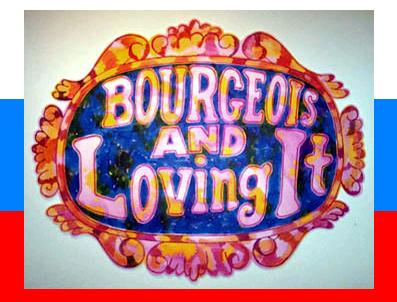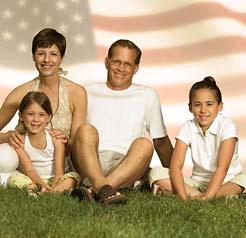
Radio Liberty, apparently.
Yesterday, the first of their three part series exploring the middle class across the former Soviet bloc was dedicated specifically to ‘what it means to be middle class’.
Yet without ever defining the slippery concept of middle class itself, Charles Recknagel concludes that, unlike their supposedly heroically liberal and democratic Western counterparts, Russia’s middle classes “don’t endorse the values of democracy and liberalism. They support the social, political, and economic order that has been formed over the past decade in Russia”.
Because the middle class in America and Europe surely don’t “support the social, political, and economic order” there?

(Actually, one subset of the US middle class certainly didnt – the tea party protesters. But somehow I doubt that is who Recknagel is holding up for emulation).
The article berates the fact that “in Russia the stage today is dominated by politically loyal entrepreneurs” and that “there is a widening gap between the wealthy ruling elite and the poor majority”.
Yet this is just as true of America, where I am yet to see a dissident entrepreneur and where “income inequality… is at an all-time high, surpassing even levels seen during the Great Depression, according to a recently updated paper by University of California, Berkeley Professor Emmanuel Saez”.

What did Recknagel hope to find, anyway?
Expecting to stumble across the depositories of Russia’s revolutionary or emancipatory energies amidst the ranks of boring, risk averse, status-obsessed, insecure, conformist, careeristic straight-laced businessmen and upwardly mobile professionals would be like trying to catch a glimpse of Solzhenitsin at a Politbureau meeting.
If he was looking for rebels, Recknagel should have done the obvious and looked in the same places you’d expect to find them in America or Europe – the underground arts scene.
The sort of people who listened to punk legend Viktor Tsoi at unofficial concerts in the Soviet Union, attended Caryl Churchill plays in 80s London or saw Dario Fo perform in Italy.
Thankfully, another Radio Liberty report did just that.
Byron Asher chronicles the “small but significant coterie of gritty, alternative theaters that eschew the mainstream Russian classics — Anton Chekhov and the like — and are dedicated to producing only new, socially relevant plays by young playwrights… tackling social and sometimes political issues that nobody else will”.
“The main goal is to revive a type of theater than can change people, that can transform them in the space of an hour and a half,” says one such new playwright, Maxim Kurochkin, author of Vodka, Fucking and Television. “We haven’t had a chance to see such theater lately. I’m interested in theater that is dangerous for society, that is destructive and brings transformation.”
Who cares about Recknagel’s beloved middle classes?
We hear: ‘They won’t take risks
Because they’ve got it all
They’ve got a home, with an electric light’
And I don’t know which of us is right.
Rain awaits me out in the street; dinner awaits them at home
Shut the door behind me; I’m leaving
But if you get sick of your cosseting light,
You’ll find a place here among us
Where there’s enough rain for everyone.